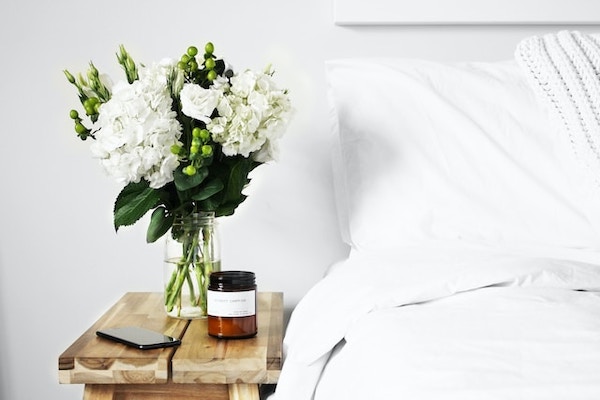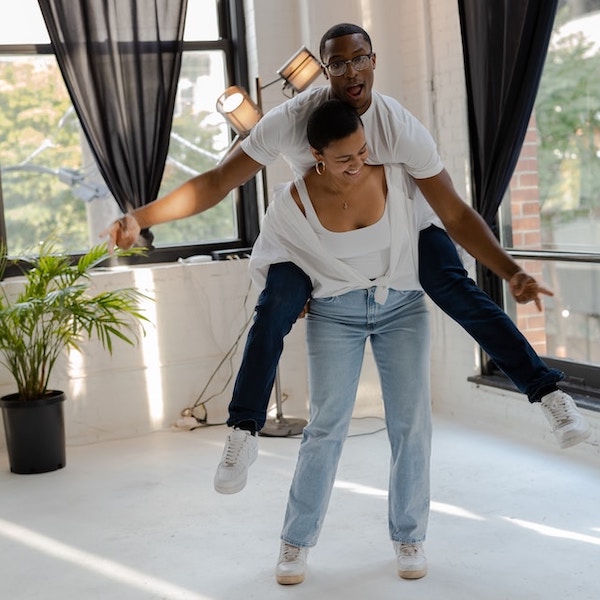You wake up in the morning. The thick, cosy blankets are covering you. You’re slowly coming back into the world of the awake. Your eyes are still a little bit blurry, you’re blinking them open. And before you realise, you’ve reached your hand out, taken your phone, and you’re looking at it!
You think you’re doing it to check the time, but without even realising it you’ve opened up your messages or email, or even just a book. By the time you’re fully awake, you’re already on your phone. You find yourself there.
It’s not something that you did fully consciously, it was only a semi-conscious decision.
If you’d prefer to listen to this episode, go here. Or continue reading.
Now, that’s a habit
If you wake up in the morning and you reach out and your phone is not next to you, it feels off. It feels odd. You might even reach out a few times, remember, “oh, there’s no phone next to me”, but then after a few minutes again reach out for it.
You keep doing that because you’ve already formed the habit of checking your phone every morning.

Then you wake up, get out of bed, and you think, “I’ve got to brush my teeth now.” And you go and brush your teeth. That’s a conscious habit.
The phone, it was a semi-conscious one, the brushing your teeth, it’s a conscious one. You do it because you think, or you know, it’s good for you.
Throughout the day, we have habits, some are conscious, some are unconscious, some are partially conscious
It’s in this whole spectrum from very intentional habits to very unintentional ones. We’ve developed this over years and years of our lives. Some of them are such a big part of us that we don’t even have to think about it. We do it without even realising we’ve done it.
For example, locking the door at the end of the day, or turning off a certain light, turning off the gas. These are just a few examples. Sometimes you go to bed and you wonder, “did I lock the door? Did I not do it?” That’s because you’ve done it unconsciously.
And it helps to realise that it’s very likely you have done it, because this is a habit so inbuilt into your system that you don’t realise you’re doing it.
We can use the awareness about all of this, about our particular habits
The kinds of habits we have daily, weekly, monthly…things that are a part of who we are, like our personality. Things that don’t even need a second thought from us and they just happen, they just get done.
And things which we feel like, “okay, this is good for me, so I have to do it”, or, “I have to stop myself from doing this, because it’s not good for me.” These are the kinds of habits that we all have. And when we become aware of them, we’re able to use them to our advantage because each of us has different kinds of tendencies.
When we realise, “I have a tendency to do a certain thing that may not be good for me,” you’re able to become aware of something that you may do in a semi-conscious state. Like the phone, it wasn’t next to me. Why? Because I kept it far away, so that I don’t reach out for it every morning.
Same with snacking
Sometimes you’re watching TV, you’re deeply involved in the serial. Somewhere in the middle, your brain says, “I want chips!” Or you’re watching and somebody’s drinking coffee in the TV show, and then you’re like, “I want coffee!”
You’ve made it, you’re sipping on it or you’re munching on something, and then you don’t realise that it’s over. It’s over already. You’ve associated eating chips or drinking coffee with watching TV.
And the more number of times you do this, the more of a habit it becomes
It becomes more and more unconscious as we keep going on and on with it. So how do we ensure that we create habits for ourselves that become unconscious, that becomes second nature? How do we ensure that we take our healthy, conscious habits and make them happen in our lives where we aren’t even actually making them happen consciously? They just happen. We just do it.

One very good way to make sure you inculcate a new habit that’s good for you, is to piggyback it on to an existing habit
Last time when I had my Harmonious Multi-Passionate Life Course, my students figured this out on their own. Though the course was about forming habits, organising yourself, making sure you’re setting aside time for different things, this is something I didn’t really teach as a part of the curriculum. And yet, they immediately figured it out because they were already thinking in terms of organising things.
One student shared that they started listening to the audio lesson on their drive home from work. They said that because they know they’ll be driving home every day, and they link that habit of listening to the course with the drive back home, it becomes automatic overtime. And then they get home after listening to the lesson, freshen up, and sit and do the action step.
Another participant shared that she’d make use of her lunch break. While eating lunch she’d listen to the lesson, and then after she’s done with eating, sit down and do the work, the action step.
So this way, both of them ensured that they consistently did the lessons, consistently did the homework
I was pretty impressed by that. I thought it was cool that they figured this out. It’s a very simple thing, right? But often we think, “okay, today I have to do something. I have to exercise for 20 minutes or I have to do this lesson or I have to read this book.”
“I have to do it today at some point” versus “I will do it when I do a certain other thing which I know I’m any way going to be doing.” It’s an existing habit. And you piggyback this new habit on to the existing habit to ensure that it happens. Then it won’t take too much effort on your part.
So yeah, I just wanted to talk about all these habits and ways to inculcate them. How to develop new good habits for ourselves, how to let go of ones which aren’t good for us by developing habits over them.
Erasing one habit over another
Like my picking up the phone habit. I could erase it by creating a habit of, say, sitting up in my bed and chanting every morning. You know, that kind of thing.
So to let go of something that you do at a particular point of time, you have to slot something else in its place so that the original habit gets removed.
I’d love to hear back from you! Share with me what your habits are, which you feel are conscious, which you feel are not so conscious, and the ways in which you develop new habits. The little tricks that you lean on so that you can inculcate good new habits for yourself.
I use Otter for all my transcriptions, and it’s awesome! Try it out.
Listen to the episode on the audio player below 👇🏽 (or on any podcast app that you like).
If this is your first time here, I invite you to find out more about The Feel Good Factor Podcast. If you think this content can help someone, do share the episode with them. I’d also greatly appreciate a rating/review wherever you listen to podcasts. They help the show get discovered by more people who resonate with this kind of message.
Susmitha Veganosaurus

“I’m a Spiritual Vegan Multi-Passionate Entrepreneur. I read voraciously, find humour in most things, and believe kindness and authenticity can make this world a happier, loving place.
If my content resonates with you, join my free newsletter where I share Life and Business Tips, Vegan Hacks, Holistic Guidance, and more.
Vegan cuisine and holistic business building are my two biggest passions. If you’re looking for guidance with vegan cooking, or want to grow your conscious business with joy and fulfilment explore ways we can work togetherhere.”